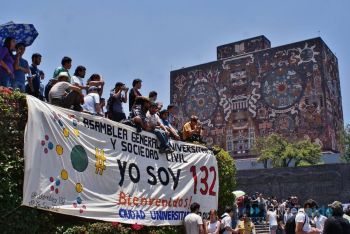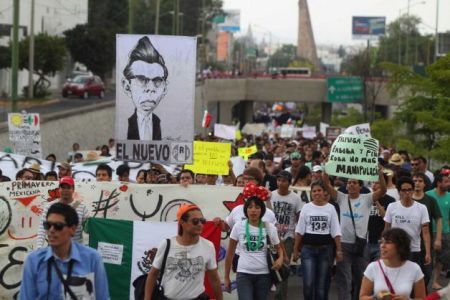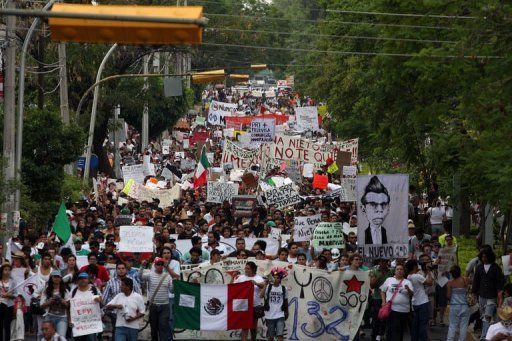
Publisher:
Bonnie King
CONTACT:
Newsroom@Salem-news.com
Advertising:
Adsales@Salem-news.com

~Truth~
~Justice~
~Peace~
TJP
Jun-18-2012 18:30

 TweetFollow @OregonNews
TweetFollow @OregonNews
Inside Mexico's New Youth Rebellion
Kent Paterson for Salem-News.comWeekend leafleting was just one of many actions carried out by a new youth movement that's shaken up the 2012 Mexican elections.
 Courtesy: citizenside.com |
(LAS CRUCES, NM) - In Aguascalientes, Mexico, a group of young people passed out leaflets to passerby in the city's busy downtown. A young woman wore a homemade poster that protested the murders of women in the state of Mexico, while her companions distributed leaflets that flashed a satiric image of former Mexico state governor and current presidential candidate Enrique Pena Nieto. Contrasting Pena's spending on publicity with a state debt the 2012 standard-bearer of the Institutional Revolutionary Party and Mexican Green Party reportedly left behind, the broadside also criticized Pena's gubernatorial record for other affronts to society including increased crime rates, higher malnutrition and the 2006 state raid against protesters in the town of Atenco that resulted in international human rights complaints of police rape.
"Inform yourself well," the leaflet appealed. "And think through your vote."
The weekend leafleting was just one of many actions carried out by a new youth movement that's shaken up the 2012 Mexican elections after it spontaneously erupted as a protest against an appearance by Pena this spring at Mexico City's private Ibero-American University. Pena minimized the protest, dismissing it as a group of 131 demonstrators.
In response, Ibero-American students gathered another large group to proclaim "I am 312." Thus was born Mexico's Yo Soy 132 Movement (I am 132 Movement), according to activist Guillermo Sanchez. The action captured the imagination of the nation's young, said Sanchez, a 22-year-old student at a private university in Aguascalientes. New groups from both private and public universities adhering to a cause demanding media openess and protesting the alleged imposition of Pena as the nation's next chief executive sprung up in Tijuana, Guadalajara, Aguascalientes and many other cities, Sanchez recalled in an interview. "The social networks exploded and all the states exploded," he added.
In Aguascalientes, an initial anti-Pena march attracted 300-400 people, according to local estimates. On June 10, a second march drew about 1,000 demonstrators. Meanwhile, tens of thousands took to the streets in Mexico City and other places across the republic.
The protests challenged stereotypes of Mexican youth as apathetic cynics, jobless slackers, party animals and heartless gunslingers in the employ of organized crime.
The 132ers quickly directed their fire against Televisa and TV Azteca, Mexico's two privately-owned television networks that form not only a duopoly of the airwaves, but are connected with banking, gambling and other commercial interests as well.
 |
The movement's contention that Televisa had long promoted Pena in return for stratospheric sums of money was supported by stories and documents printed by the British Guardian newspaper; the Guardian's version was in turn was backed by U.S. diplomatic cables released by Wikileaks.
"We saw the money behind (Pena's) candidacy and that bothered us," said Julio del Avellano, a leading 132er in Aguascalientes. "It's a sign that there is no democracy." But del Avellano was quick to add that contrary to detractors' charges, his movement does not endorse Pena's rivals either. "We are independent and not supporting anyone," he affirmed.
Almost from nowhere, the 132 Movement not only succeeded in mobilizing thousands of young people in street protests against Pena and media monopolization, but recast Mexico's elections by thrusting questions of money and politics, economic power and corruption and education and citizenship into the center of the political process.
Formed by a generation of media and tech-savvy youth, 132 shows no signs of losing its creative knack. A new video produced for the Internet shows parents of 132ers speaking out in support of their children, while another features young people ribbing Pena for declining to appear at the presidential debate scheduled for transmission on the Internet on Tuesday evening, June 19. Pena has said the debate inspired by the 132 Movement will not be fair.
Originally scheduled solely for the Internet, the June 19 debate between three of the four candidates (Andres Manuel Lopez Obrador, Josefina Vazquez Mota and Gabriel Quadri) might now be broadcast on some of the smaller Mexican television channels. If the race is tightening as some polls indicate, Pena's expected absence could prove to a grave error on his part as along as the elections proceed without major manipulation.
In its very short life so far, the 132 Movement has scored impressive victories. In addition to forcing a third presidential debate, the new generation of activists can claim credit for getting the Federal Electoral Institute (IFE) to expand the number of election observers.
Cognizant of the fact that only a minority of Mexicans have regular access to the Internet, the 132 Movement employs a host of tactics in its campaign for expanded democracy. Street and bus brigades of leafletters, rock concerts, public showings of videos and mass marches are some of the ways activists reach the public. In Aguascalientes, for instance, activists planned to project a documentary on a large screen in the downtown plaza, but were temporarily thwarted when after-winds from the ironically named Hurricane Carlotta (the same name as the wife of the French-imposed, 19th century Mexican ruler Maximilian) kept blowing the screen down. No matter.
In a burst of ingenuity, the 132ers simply beamed the video onto the nearby wall of the federal building that houses the local offices of the IFE, Interior Ministry and Foreign Relations Secretariat. Produced by movement activists, the documentary explored Pena's relationship with a historically powerful group of Mexico state politicians, delved into the violent repression of the 1968 and 1971 Mexican student movements, discussed the 1997 Acteal massacre of indigenous Mayans and sprinkled images of the modern world revolt, with protest scenes from Hong Kong, Oakland, Albuquerque and many other places.
In conversations, 132ers identify with a larger global uprising that spans Occupy Wall Street, the Chilean and Quebec students, Spain's Indignados and many others. And almost as fast as the movement has grown in Mexico, so has solidarity with it abroad. Messages of support have poured in from the U.S., Canada, England, Argentina and Egypt. Returning the gesture, the 132ers held a demonstration last week outside the Canadian Embassy in Mexico City in support of Quebec's striking university students. Also last week, Camila Vallejo, vice-president of the University of Chile Students Federation, visited Mexico to attend a university seminar and meet with the 132 Movement.
"We must have a global vision to change," Vallejo was quoted in the Mexico City daily La Jornada. "The problems of the right to education are the ones of the world neo-liberal model. It has to be confronted on a global scale, not to repeat the experiences of other countries or to export ours, but to nurture each other, to share and to learn." Vallejo expressed surprise that the Mexican movement initially arose at a private school, but others familiar with national peculiarities were not as puzzled.
 |
Longtime Aguascalientes political activist and analyst Fernando Rivera Ibarra told Frontera NorteSur that the Ibero-American University had a role in the 1968 student revolt. "It's understandable (132) is from the Ibero, because of its Jesuit formation of free thinking," Rivera said. The veteran political observer noted that the '68 movement transformed into a broader, popular movement for democratic change before it was smashed by government security forces. A similar evolution is beginning to happen with the 132 Movement.
In recent days, the Mesoamerican Migrant Movement (MMM) and the 132 Movement linked up to protest human rights violations against Central American and other migrants passing through Mexico to the United States. "We are 132" declared the MMM in a statement accompanying the occupation of a train that moves migrants across the southern states of Chiapas and Oaxaca. Underscoring that 60 percent of migrants are between 15 and 30 years of age, the MMM urged solidarity with people who suffer "persecution, mistreatment, murder, sexual exploitation, kidnapping and rapes at the hands of organized crime in complicity with the police authorities of Mexico."
132 Movement activists voice different motivations for joining the struggle-outrage over human rights violations, the economic frustrations of an educated, stifled generation and yearings for genuine democracy. A serious young man who studied international business and recently graduated from a private university, Julio del Avellano runs a small clothing store that markets his own designs. "I'm in this because of conviction, not out of necessity," del Avellano said. "We don't believe in the political system or in the institutions in general. The parties are corrupt, some worse than others, but it's all bad."
If the 132 Movement can be said to have an ideological bent, it's one of fusion, drawn as much from the battles of the 1910 Mexican Revolution and contemporary Zapatismo as the philosophical sparks of the post-2011 world revolt. According to a young 132er who preferred to identify himself as Alejandro, many activists are influenced by the writings of Stephane Hessel, a 95-year-old European author, World War Two resistance fighter and Nazi concentration camp survivor. A contributor to the 1948 Universal Declaration of Human Rights, Hessel's more recent works have explored the inequalities of the world economy, attacks against migrants and environmental destruction.
"TV Azteca is a big show that does not reflect the reality of our country," said Yoli Ramos, a 20-year-old university student in Aguascalientes. " I believe society could organize to have a better quality of life," the young woman said. "We know what is wrong and we know what does not function in the government and system...it's time to act."
For now, the 132 Movement is pushing for an informed and aware electorate, greater media democracy and government transparency. A big goal, exhibited in protest signs that proclaim "Televisa Makes You an Idiot," is to get young people away from the Tube and thinking critically about everyday political, economic and social issues. Both Yoli Ramos and Guillermo Sanchez said they will vote for president for the first time on July 1. Given the weight of young people in the current registration rolls, their generation could swing the election and change the course of history in Mexico if it turns out to vote in a significant way on July 1.
With less than two weeks to go before the fateful day, 132 has mapped out a hectic schedule of activities. More street brigades, public video projections of the June 19 debate, a big rock concert and a June 30 mega-march in Mexico City are on the agenda. On election day, activists plan to be stationed outside voting booths ready to immediately upload any reported irregularities onto the Internet.
"I would like to clarify that this is a long-term movement that was not born for the election, or to further a candidate," said Aguascalientes' Julio del Avellano. "We're going to make demands on whovever wins, whether its Pena Nieto, Josefina Vazquez, Lopez Obrador or Gabriel Quadri." The young entrepreneur and activist said the 132 Movement still has a long road ahead of it. "Not all the young people have woken up," he added, "but the participation of young people has increased in comparison with previous elections."
-Kent Paterson
Frontera NorteSur: on-line, U.S.-Mexico border news
Center for Latin American and Border Studies
New Mexico State University
Las Cruces, New Mexico
-------------------------------
Tweet
Follow @OregonNews
 |
 |
 |
 |
 |
 |
 |
Articles for June 17, 2012 | Articles for June 18, 2012 | Articles for June 19, 2012
Salem-News.com:





Terms of Service | Privacy Policy
All comments and messages are approved by people and self promotional links or unacceptable comments are denied.
Anonymous June 20, 2012 1:38 am (Pacific time)
Oh goody, maybe that will be the "Mexican Spring"? And just maybe Obama will make sure that his friends, the Muslim Brotherhood is taking over. Just like in Egypt.
[Return to Top]©2025 Salem-News.com. All opinions expressed in this article are those of the author and do not necessarily reflect those of Salem-News.com.